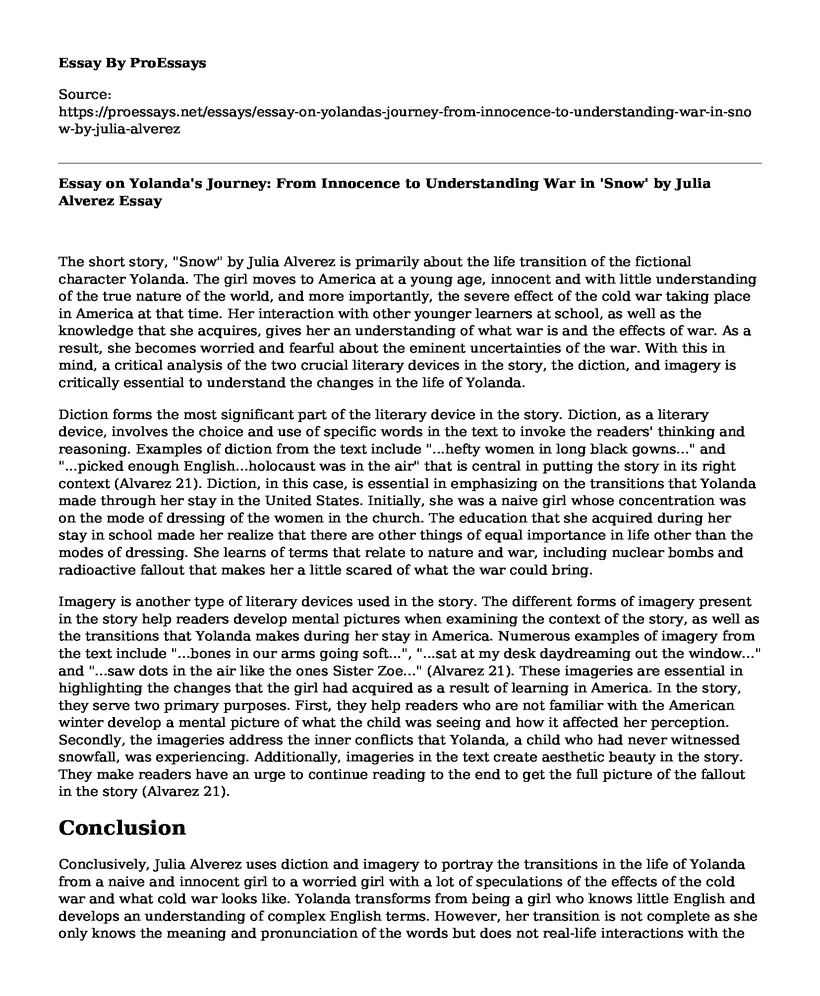The short story, "Snow" by Julia Alverez is primarily about the life transition of the fictional character Yolanda. The girl moves to America at a young age, innocent and with little understanding of the true nature of the world, and more importantly, the severe effect of the cold war taking place in America at that time. Her interaction with other younger learners at school, as well as the knowledge that she acquires, gives her an understanding of what war is and the effects of war. As a result, she becomes worried and fearful about the eminent uncertainties of the war. With this in mind, a critical analysis of the two crucial literary devices in the story, the diction, and imagery is critically essential to understand the changes in the life of Yolanda.
Diction forms the most significant part of the literary device in the story. Diction, as a literary device, involves the choice and use of specific words in the text to invoke the readers' thinking and reasoning. Examples of diction from the text include "...hefty women in long black gowns..." and "...picked enough English...holocaust was in the air" that is central in putting the story in its right context (Alvarez 21). Diction, in this case, is essential in emphasizing on the transitions that Yolanda made through her stay in the United States. Initially, she was a naive girl whose concentration was on the mode of dressing of the women in the church. The education that she acquired during her stay in school made her realize that there are other things of equal importance in life other than the modes of dressing. She learns of terms that relate to nature and war, including nuclear bombs and radioactive fallout that makes her a little scared of what the war could bring.
Imagery is another type of literary devices used in the story. The different forms of imagery present in the story help readers develop mental pictures when examining the context of the story, as well as the transitions that Yolanda makes during her stay in America. Numerous examples of imagery from the text include "...bones in our arms going soft...", "...sat at my desk daydreaming out the window..." and "...saw dots in the air like the ones Sister Zoe..." (Alvarez 21). These imageries are essential in highlighting the changes that the girl had acquired as a result of learning in America. In the story, they serve two primary purposes. First, they help readers who are not familiar with the American winter develop a mental picture of what the child was seeing and how it affected her perception. Secondly, the imageries address the inner conflicts that Yolanda, a child who had never witnessed snowfall, was experiencing. Additionally, imageries in the text create aesthetic beauty in the story. They make readers have an urge to continue reading to the end to get the full picture of the fallout in the story (Alvarez 21).
Conclusion
Conclusively, Julia Alverez uses diction and imagery to portray the transitions in the life of Yolanda from a naive and innocent girl to a worried girl with a lot of speculations of the effects of the cold war and what cold war looks like. Yolanda transforms from being a girl who knows little English and develops an understanding of complex English terms. However, her transition is not complete as she only knows the meaning and pronunciation of the words but does not real-life interactions with the application of the concepts. Therefore, she is afraid when she sees snow falling as she confuses them with a bomb explosion following the close resemblance in the description given by her teacher.
Works Cited
Alvarez, Julia. "Snow." Northwest Review 22.1 (1984): 21.
Cite this page
Essay on Yolanda's Journey: From Innocence to Understanding War in 'Snow' by Julia Alverez. (2023, May 23). Retrieved from https://proessays.net/essays/essay-on-yolandas-journey-from-innocence-to-understanding-war-in-snow-by-julia-alverez
If you are the original author of this essay and no longer wish to have it published on the ProEssays website, please click below to request its removal:
- Compare and Contrast Essay on Mora's poems: La Migra and Elena
- Use of Racial Slurs in the Adventures of Huckleberry Finn
- Natalina Trethewey's Poetry Essay Example
- The Poem About the Accents in the Book "A Year in the Merde"
- Essay Sample on The Third Birdhouse: A Symbolic Tale of Family and Love
- Essay Example on Oscar Wilde: Great Poet, Visionary Writer of Victorian England
- Paper Example on Chimney Sweeper's Agony: William Blake's Poems on Innocent Children's Suffering







